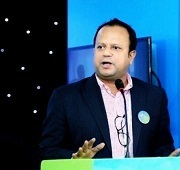Is it the right time to push for wallet interoperability in Bangladesh?
by Akhand Tiwari and Jakirul Islam
Apr 30, 2020
5 min
Covid-19 is impacting people’s lives in multiple ways. With restrictions on movements and fear of getting infected, people are staying homes. While this is the right thing to do, one still need to purchase household essentials and send money to relatives who need it. Essential services industries also need constant cash flows and payments. Jamal […]
Covid-19 is impacting people’s lives in multiple ways. With restrictions on movements and fear of getting infected, people are staying homes. While this is the right thing to do, one still need to purchase household essentials and send money to relatives who need it. Essential services industries also need constant cash flows and payments. Jamal offers one such service. He is a fish seller. He travels 30 kms everyday from his village in Narayanganj to sell fish in Dhaka. He receives bulk payments from customers – once in 15-20 days, both in cash or in his bKash wallet. But that’s the story of pre Covid-19 time.
Policymakers have proactively taken steps to ensure financial service needs to people are not hampered
MFS providers, such as bKash, Rocket, and Nagad have emerged as key channels for fast and cost-effective fund transfers with minimal manual interventions. Bangladesh Bank asked the competent authorities from the Home and Finance Ministries and Bangladesh Police to take essential action for asserting mobile financial services (MFS) as emergency services amidst the ongoing closure following the coronavirus outbreak. The Bangladesh Bank has also made MFS cheaper through its directive which says that no transaction charge would be levied to purchase medicines and other essential commodities using MFS P2P transfer and debit or credit cards. The merchant discount rate and interchange reimbursement fee will not apply to a transaction limit of BDT 15,000 per day and BDT 100,000 per month. Further there will be no charge for MFS cash-out of BDT 1,000 daily at a time. The current charges are BDT 20 for BDT 1,000 withdrawal. The monthly ceiling of MFS P2P transactions has been raised from BDT 75,000 to BDT 200,000. The transactional premises of banks, ATM booths, POS, and agent points are required to be disinfected periodically and equipped with hand sanitizer.
In addition, readymade garment factories have been directed [by whom??] to pay all salaries to workers and employees through MFS accounts. This must be done by 20th April, 2020. It is important to note that the government and stakeholders had committed to making wage payments to around 90% of the country’s garment workers digitally by 2021 as part of the government’s target to develop a cash-lite digital ecosystem in line with the vision of “Digital Bangladesh”. Infrastructure development, creating awareness among owners and workers, and financial and digital literacy are the major challenges in bringing all the garment workers under the digital wage payment system. Currently, more than 1.5 million out of 4.0 million garment workers have been receiving their wages digitally. With Government’s current push some of these challenges will be addressed. The circular suggests banks and MFS providers create immediate awareness of the scheme amongst target customers and direct/help them to open MFS accounts. Customers can open these accounts free of cost. We learn that bKash is now registering more than 50,000 new wallets of RMG workers every day. Almost 70% of these wallets are registered at its digital registration agent points.
Although transactions are reducing but it does not indicate that people do not need money
bKash has been managing, on average, 5.7 million transactions of BDT 4,500 million (USD 53 million) since the government’s general leave from 27th of March 2020. At the same time, 150,000 consumers across the country have paid for electricity bills through bKash in a single day. But compare this with pre-covid-19 situation: bKash handled approximately BDT 10,000 million (USD 119 million) in terms of transaction value.
Almost all MFS agents remain closed under the lockdown situation; the remaining agents open their shops for limited hours in a day. The regular earning of the low-income group people, such as rickshaw pullers and daily laborers has been reduced significantly and in many cases eliminated. They have been living on limited means with aid from the government along with other social organizations and NGOs. Such lower-income people use cash-in/cash-out/P2P almost every day—such transactions have reduced. An ongoing MSC study has found that the incomes of some MFS agents have reduced by 50%-70%.
Activity at ATMs has reduced as well. For Dutch-Bangla Bank country’s leader in ATM banking, daily transactions at ATMs have reduced by 30-35%. Bank Asia’s agent banking outlets are conducting almost 20% of the transactions they performed in pre-covid-19 times. Most of the agent banking outlets remain closed during this pandemic lockdown situation.
These extraordinary reductions in transactions can be attributed to restricted movement of people, slump in economic activities, and the closure of service points.
Jamal is impacted as well. While he is not selling fish currently, but he has payments due from his customers that could help him wade through these difficult times. Sadly, though, some of his customers only have Rocket wallet and cannot send money to him.
Money is indeed not moving smoothly between rural and urban areas, because banks and agent banking outlets have limited operations. Those MSMEs that were operating through banks are facing challenges in making and receiving money, as banks are not working in full capacity.
Can interoperability of wallets help?
Developing an interoperable switch is not an easy technology. It is a complex process that ensures that the customer user experience is seamless and pricing is just. The backend system of a switch, settlement process for providers, pricing amongst the parties, etc. has to be carefully thought of as well. The regulator needs to establish a governance framework that is transparent and inclusive, and a strong Anti-Money Laundering (AML) compliance for interoperability.
We wonder if in these times where everyone is working hard to make basic things work, Bangladesh Bank has the bandwidth to put interoperability into practice. The easiest bit can be tried first. In our opinion that will be MFS wallet to MFS wallet interoperability. That is a customer having a Rocket wallet will be able to send money to a bKash wallet. But this type of interoperability may have unintended impacts on how agents operate. MFS provider and regulations can be tightened to ensure thriving competition in the market. MFS wallet to MFS wallet interoperability will impact 80 million registered wallets across 64 districts in Bangladesh—and positively, we believe.
The most profound impact will be on people’s financial lives. An interoperable wallet facility will reduce at least one worry of ensuring that both parties have same wallet service providers. This will impact all MFS users including the newly on-boarded RMG workers. It will bring ease receiving and making payments for goods and services especially for MSMEs, who are likely to adopt payments via MFS wallets as the Bangladesh Bank has already increased the limit for P2P to BDT 200,000.
The authors are international financial inclusion consultants from MSC – a boutique consulting company working on meaningful financial, social, and economic inclusion. They can be contacted at Jakirul@dev.microsave.net and Akhand@dev.microsave.net
The blog was also published on Financial Express on 27th of April, 2020
Written by

 by
by  Apr 30, 2020
Apr 30, 2020 5 min
5 min
Leave comments